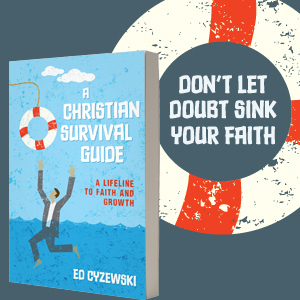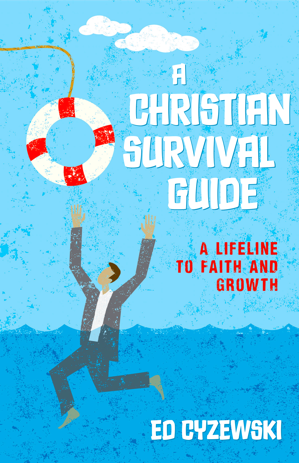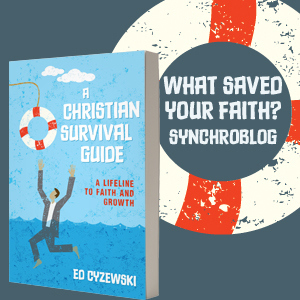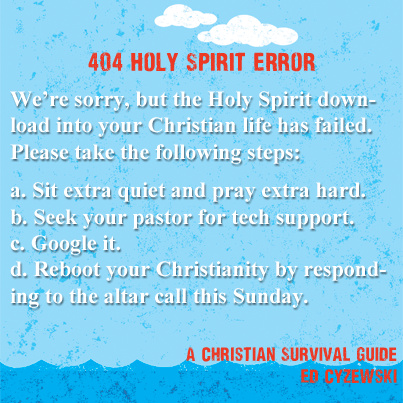Ed Cyzewski's Blog, page 31
August 19, 2014
A Guest Post for Rachel Held Evans: How God Handles Our Doubts
I’m guest posting today for Rachel Held Evans today, which is both an honor and quite intimidating. Rachel wrote one of the best books about facing our doubts when she shared her personal faith journey in Faith Unraveled. It’s one of the books I recommend in A Christian Survival Guide because of its bracing honesty and commitment to exploring the scriptures. It’s also really well written–which is why it’s intimidating to guest post for Rachel. Thankfully, Rachel has been one of the most generous authors I know, sharing her place with anyone who may have something helpful to share with her readers.
In today’s guest post is adapted from A Christian Survival Guide and addresses the way God deals with Christians who doubt… which is the exact opposite of what I expected for most of my Christian life…
A few years ago I felt like prayer had stopped working. In fact, I began to doubt whether it had ever worked at all.
I was just talking to myself in an empty room. Quieting myself to “hear” God really didn’t work either. In fact, that just made things worse. The longer I waited with nothing happening, the more my anxiety kicked into gear, worrying that God really wasn’t going to respond.
I know that some Christians go through a season of doubt like this and can’t survive. They can’t find God and have to give up. In my own case, I held on. I can’t make it sound like I did something better. I just ended up in a different place after seeking prayer and counsel from trusted friends and family who walked with me through that season.
However, I know that many Christians and former Christians haven’t found the same resolution for their doubts. In fact, admitting your doubt feels like admitting failure, if not giving fellow Christians a reason to condemn and judge us for unbelief.
I’ve been on both sides of doubt, playing the part of judge at one point and doubter at another.
It’s easy to be dismissive toward those who have doubts because we really, really don’t want to have the same problems. It’s disturbing to hear that someone who grew up in the same church as you and attended all of the same Bible studies and prayed all of the same prayers is either doubting God or thinking of leaving the faith altogether. Let’s be honest about the problem here: If this person is about to leave the faith or has already left the faith, why can’t the same thing happen to you as well?
What should we do about doubts?
We don’t want doubts to linger, but we need to address them patiently and honestly. Where do we begin?
Read the rest of today’s post at Rachel’s blog.


What Is God’s Role in a Violent World? My Guest Post for Nate Pyle
I’ve known Nate Pyle through social media and blogging for about a year now I suppose, but we finally met in person at the Festival of Faith and Writing last Spring. We had a great chat during a writers happy hour, and I got to learn a bit more about his upcoming book and some of his writing projects, which are all fantastic. I’m really honored to contribute a guest post to his blog during the release of A Christian Survival Guide (which is $2.99 this week!), sharing an excerpt from the book about God and violence: “Deliver Us from God?”. When you’re done reading my post, make sure you subscribe to Nate’s blog and follow him on Twitter.
“The Lord is a warrior; the Lord is his name.”
Exodus 15:3
We don’t have to look further than the rubble-filled streets of Gaza to recognize our world’s problem with violence. From military conflict to mass shootings, violence is a common tool for solving “problems.”
A quick breeze through the pages of the Bible reminds us that nothing much has changed. In fact, it appears that even God resorted to acts of violence in order to solve “problems.”
There’s no getting around the words of scripture. God is described as a warrior in the book of Exodus. So, is it accurate to say that God is violent? Do we misrepresent God? And if God is violent, would we want to worship such a God?


August 18, 2014
Buy A Christian Survival Guide and 3 Other Books for the Price of One
Starting Monday, August 18th and ending Friday, August 22nd, three of my most recent books will be $2.99, and one will be $4.99. Best yet, my latest book A Christian Survival Guide is available as a free eBook on Monday the 18th only. Here are all of the details:
A Christian Survival Guide is also being offered at a steep discount this week.
On Monday, August 18th, it will be offered as a free eBook at select sites:
Tuesday-Friday, August 19-22, it will be offered for $2.99. (See also the Publisher)
Print Copies: Get $3 off on Amazon this week.
DISCOUNTED EBOOKS: The Good News of Revelation and Hazardous (a book about making the risky decisions that result from following Jesus), are both $2.99 at Amazon. Unfollowers is $4.99 at my publisher’s website. Scroll down for the links. All offers end August 22nd!
Publisher’s Weekly shared about A Christian Survival Guide:
“Cyzewski approaches each topic with candor, sharing stories that make it easy to relate to the topic at hand. While many of the topics are complex, he provides a point of entry into each and raises thoughtful questions about how much importance Christians can assign to aspects of the discussion.”
After you’re done reading A Christian Survival Guide, I’d love for you to share what you think in a brief review.
Thanks so much for reading!

The Good News of Revelation
$2.99 on Amazon

Hazardous: Committing to the Cost of Following Jesus
$2.99 on Amazon
Purchase from the publisher.
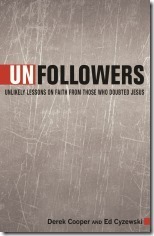
Unfollowers: Unlikely Lessons on Faith from the Doubters of Jesus

Purchase from the publisher for $4.99.

A Christian Survival Guide
FREE (Monday) or $2.99 (T-F)
Learn More Here…
Purchase from the publisher.
Note: All Amazon links are affiliate links.
Thanks so much for reading my books. If you have a moment today to share this post using the social media links below, I’d be grateful.
Happy reading!


August 17, 2014
What Saved My Faith: A Synchroblog about Christian Survival and a Big Book Discount
I wrote last week about my doubts that arose when I didn’t receive any obvious manifestations of the Holy Spirit and God felt distant whenever I tried to pray. Much to my dismay, there wasn’t a quick fix to my faltering faith. I’m writing a follow up post as part of a synchroblog this week: What Saved My Faith? Synchroblog details are at the end of today’s post:
When God felt distant throughout my early 20’s, I felt like my faith was completely breaking down. The only way to save my faith was to ask the question that I thought would mean losing it:
“Why has God abandoned me?”
What did my lack of charismatic experiences mean about my faith or about God?
I couldn’t figure out a way to make prayer work until I acknowledged that I’d hit a dead end. I had to admit that I was struggling to connect with God. In fact, one word sums my experience up:
SILENCE.
While I wouldn’t describe myself as particularly charismatic at the time, I was used to spiritual experiences. I’d had many moments where the words of scripture seemed to jump off the page, and I sensed either an intense joy or sorrow. I’d felt conviction to make major life changes. I’d felt God’s presence while praying int he past.
However, one day it all just fell apart. I can’t say what exactly happened. It’s not like you plan for prayer to stop working or for insecurity to become the norm. Prayer, which had just flowed before, was riddled with uncertainty, doubt, and fear.
The Bible describes a present God who is able to meet people when they pray. That was not my experience.
I quickly became an anxious Christian. I wanted my spirituality to work, and if it didn’t work the way I expected it to work, then I feared that I’d been abandoned by God.
It’s not that I didn’t believe in God. I’d experienced too much. Rather, I just feared abandonment. All of the promises of scripture couldn’t squelch the burning anxiety that God had abandoned me.
“Where are you God? Why won’t you come near?” I asked each day.
I knew so many people who heard God speak, who experienced God, and who sensed God’s direction in their lives.
Why not me?
I had to start believing something without personal proof: What if God was near even if I couldn’t sense God’s presence? What if I had to remain faithful without any assurance that God saw me?
I had to learn how to wait on God.
I’ve been surrounded by Christians who talked about victory and breakthroughs, but I didn’t have any concept of a dark night of the soul. One thing pulled me out of my downward spiral into darkness: I relied on the prayers of others.
First, I asked for prayer.
I asked for a lot of prayer, in fact. Each time I received assurances. I gave God every opportunity to tell me what I was doing wrong through the people praying for me. It turned out that I wasn’t living in sin or on the brink of being cast into the flames of hell or anything else.
In fact, my father-in-law sensed that God had imparted the Holy Spirit to me. If God wasn’t angry with me, I decided to take a different approach to prayer.
I prayed the prayers of others.
When you can’t find your own words to pray, the words of the Psalms and the historic church can serve as a real life saver. In fact, as I struggled with doubts and uncertainty during my dark night of the soul (or whatever one calls these things, I’m a Protestant, remember), I relied heavily on the daily prayers from the Divine Hours (buy the books or pray online).
The Divine Hours exposed me to all kinds of prayers: petitions, laments, praise, etc. I saw that doubt, dark nights of the soul, fear, and uncertainty came up quite a bit while praying. The majority of the readings were short passages of scripture, and I saw that waiting on the Lord comes up quite a bit in the Bible and especially in collected prayers in the Hours.
Psalm 5:3
In the morning, Lord, you hear my voice; in the morning I lay my requests before you and wait expectantly.
Psalm 27:14
Wait for the Lord; be strong and take heart and wait for the Lord.
Psalm 130:5-6
I wait for the Lord, my whole being waits, and in his word I put my hope.
I wait for the Lord more than watchmen wait for the morning, more than watchmen wait for the morning.
The Psalms are full of waiting, in fact.
So I started to wait. I started to rely on the prayers of others. Slowly, gradually, I learned to wait and trust God on my own.
The more I relied on the prayers of others, the more I say that my prayers were full of pushy petitions and demanding deadlines. I was asking God to show up in the time, place, and manner I specified. Perhaps my season of silence was God’s way of shutting down the ways I’d been trying to exert my control over prayer. Who knows.
I started waiting and praying the prayers of others, and I eventually began to sense God’s presence and voice again. In silence and in the recitation of scripture, I found a new path to God that didn’t rely on crafting clever prayers. In fact, prayer became peaceful and restful, inviting God to come and simply paying attention to however the Spirit would move.
I don’t think I could have figured out how to pray on my own. I had to experience the prayers of others and copy the prayers of scripture and fellow Christians. That felt like cheating. It made me feel like a failure, as if I wasn’t smart enough to sort this out on my own.
Rather than failing, I was actually learning what faith looks like. I was learning to stop relying on my won wisdom and to seek the wisdom that can only come from God alone. By relying on the prayers of others, I finally learned what it means to pray in faith, waiting and trusting in the presence and direction of God.
The things that feel like threats to our faith are often just the necessary failure of flawed faith that must break down and shatter before real faith can take their place.
This post is part of a synchroblog for the release of A Christian Survival Guide: A Lifeline to Faith and Growth that’s answering the following question:
What saved your faith?
Write a post this week answering that question and then scroll down to learn how to join the synchroblog.
A Christian Survival Guide is also being offered at a steep discount this week.
On Monday, August 18th, it will be offered as a free eBook at select sites:
Amazon, B&N, and Google Play.
Tuesday-Thursday, August 19-21, it will be offered for $2.99. (See also the Publisher)
Print Copies: Get $3 off on Amazon this week.
How to Join the Synchroblog:
1. Write a post for your blog during the week of August 18-23.
2. Begin or end your post with something like, “I’m joining the synchroblog for the release of A Christian Survival Guide: A Lifeline to Faith and Growth by answering the prompt: ‘What saved my faith?'”
3. End with a link to today’s post. (This is the short link: “http://wp.me/p36rtR-k5″;). Add the link up information to your post, the synchroblog image, and end your post with a prompt like this: “What saved your faith? Write your own post answering that question and then visit www.edcyzewski.com to learn how you can join the synchroblog or to read additional posts to celebrate the release of Ed’s book A Christian Survival Guide, which is discounted on Amazon this week. “
4. Link to your post in the comment section on Ed’s blog post and tweet with the hashtag “#SavedMyFaith”.
5. Read other posts by checking the comments or the #SavedMyFaith hashtag on Twitter. Then comment, tweet, or share the best posts you find!


August 15, 2014
3 Reasons Why You’ll Hate My New Book
I try to avoid reading reviews of my books.
OK, I admit, if it’s 5 stars or a glowing review in Publisher’s Weekly, I’ll probably read the review. Possibly even 10-15-80 times.
But the other day I saw the first one star review show up for A Christian Survival Guide. I didn’t read it. I was just passing along the link to the book’s page and didn’t scroll down to see anything else. However, I can pretty easily imagine why quite a few Christians will really hate this book.
1. Our Christian culture has confused certainty with stability.
There’s nothing wrong with being certain about what you believe. However, there’s a big problem when we expect everyone to follow our own templates for faith. We all pass through seasons of doubt, uncertainty, or personal struggle, and the results of those seasons will differ from person to person.
There’s no single template for followers of Jesus. And actually, if there was, the template for following Jesus would be doubt and confusion. Jesus’ followers had three years to get things straight about Jesus and what kind of Messiah he was, and they still weren’t fully clear about Jesus until the very end of his ministry.
My pastor has a saying that goes like this, “In Christianity, you either become a mystic or you become an atheist.” That’s an intentional overstatement, but he gets to the heart of things: Bible study and theological systems can’t handle everything life throws at us. We all have to sort through things in our own way, and oftentimes that means prioritizing the presence of God over theological certainty.
2. This Book Is Too Liberal and Too Conservative
When someone asks if I’m conservative or liberal in my theology, I usually say, “It depends who you ask.” I’m probably too conservative for the liberals and too liberal for the conservatives. It’s not that I’m trying to land in the theological middle on every issue. Rather, I try to keep various perspectives in conversation with each other without always taking a side in each instance.
That will probably drive some people crazy. Remember, this is a book for people who are processing their faith and trying to sort out answers. If there’s a majority position that causes a lot of problems for Christians, I take some pretty major swings at it. If you love the idea of an end times rapture and hell being a place of eternal conscious torment, you’re going to really hate this book, because I present the biblical arguments against both of these positions.
That isn’t to say that one can’t believe in the rapture or hell as ECT in order to survive as a Christian. Rather, I’m helping people ask hard questions about these kinds of issues.
3. I Will Tip Some Sacred Cows
While I can’t cover every topic that may cause someone’s faith to falter, I’m also pretty frank in pointing out the kinds of issues that have become distractions from the core issues of Christian living. I write in the Introduction to the Survival Guide:
“When I speak of Christian survival, I’m talking about the real problems and doubts that can hinder your relationship with Jesus and your fellowship with others. In America we are bombarded with all kinds of campaigns, organizations, and agendas that are supposed to be important to us as Christians.
We’re told by politicians on both sides that we need to support legislation that will preserve the “moral character” of America. We learn that our country is either in danger of being taken over by maniacal socialists/fascists (which is an impossible mix by the way) who will turn America into Canada or that fundamentalists will turn our open-minded republic into the Holy Land Experience. Others warn us that men need to watch ultimate fighting or they’ll start baking cupcakes and give up their careers to stay home with the kids, and that women need to raise kids and bake cupcakes lest they spend their free time watching ultimate fighting.
We are bombarded by campaigns to build museums that tout certain agendas or prove certain views of the Bible. Some lament that America is on the brink of becoming a land crawling with atheists and therefore we need to buy a certain book, attend another conference, or believe some checklist of absolutes. Others fear that America is on the brink of being overrun with religious zealots who want to take control of the minute details of our lives.
I trust that the people behind such campaigns mean well and that they love Jesus, but these “important” issues are not essential for our faith as Christians. I’m far more concerned about getting the basics of Christianity right: learning how to pray regularly, how to commune with the Holy Spirit, how to love our neighbors, and how to read the Bible so that we can live in relationship with Christ and do God’s will on earth. If the basics are following Jesus, loving God, and loving others, shouldn’t we make our top priority the removal all of potential obstacles that could keep us from God?”
So you may hate this book. It’s a distinct possibility. Some people have already confirmed how much they disliked this book. However, I suspect that as annoying as this book will be for one group, it will be a lifeline for others. In fact, I’ve heard just that thing from many early readers who felt like I’d been spying on them and addressing the very questions that have been troubling them. It’s really impossible to answer everyone’s questions in one book.
That’s how faith works: it’s always shifting and moving. At least, that’s how it works for me. I’ve passed through different seasons. I’ve watched my faith change and grow and struggle and then shift. This is a book for a season of questions, seeking, and exploring. It’s my hope and prayer that you’ll find my book a helpful guide if you’re in that kind of season right now.
Check out A Christian Survival Guide today! You’ll… um… love it?


August 14, 2014
When Pastors Become Experts in the Wrong Things
There were two precise moments in my life that drilled home the message: You, Ed Cyzewski, are not a pastor. At least, I’m not a pastor in the traditional North American Evangelical pastor sense of the word.
Here’s One Moment:
Standing at a bulletin board littered with pastoral job descriptions in my seminary cafeteria, I saw the lists of requirements for pastoral positions. I remember thinking, “No human being can do all of this. They want to hire Jesus.”
The lists were something like this:
Strong spiritual life with commitment to daily Bible study and prayer.
Supports our doctrinal statement which is based on biblical Christianity.
Will preach at least 40 Sundays each year.
Available in the evenings for committee and ministry meetings.
Plans Sunday services.
Manages staff hiring.
Leads church meetings.
Participates in elder meetings.
Set up and coordinate small group ministries.
Oversee office staff who develop website, bulletin, and other communication.
Available to counsel individuals.
Recruit, train, and lead volunteers.
Responsible to lead evangelistic outreach to community.
Ensure church has thriving ministries for children, youth, and college students.
Provide ministries to every possible niche in a white suburban setting, including but not limited to seniors, singles, parents, athletes, gamers, introverts, and rabbit owners.
Must repair or at least kick all broken office equipment, including the copier, fax machine, and wireless router.
You get the idea. The level of commitment and expertise is staggering. There are MANY areas of expertise that pastors are called to embody.
They have to be expert managers, spiritual directors, Bible scholars, communicators, evangelists, volunteer coordinators, and technical experts. Oh, and pastors are also expected to be counselors—as in, helping people with major, major life problems.
The problems pastors are called to address in a counseling setting could include teenage rebellion, childhood trauma, marital difficulties, depression, and plenty or other severe issues that they may not even realize they’re dealing with. Sometimes people walk into a pastor’s office presenting one issue, when there’s really something else simmering under the surface. Are most pastors even qualified to handle these types of counseling situations?
I attended a really great seminary for my Master of Divinity where I could have added a few counseling electives to my requirements, but let’s just say that I coasted through my one required counseling class with a B and called it a day. I was completely out of my depth in counseling situations. When I had to counsel a friend for part of my coursework, I had no idea what to tell him about his problem.
“Pray?” (I know! Right?)
The session was supposed to last twenty minutes. I made it to fifteen by ending our session with a REALLY long prayer.
The vast majority of the pastoral positions out there came with the expectation that I would teach the Bible, counsel, manage, and micro-manage at the very least. There weren’t too many places where my gifts as a creative introvert could help churches that were calling for extroverted jacks-of-all-trades.
I may have noticed this discrepancy because I grew up in a church that had a “counseling pastor” on staff. That’s literally all he did—except for the occasional Sunday when he was dragged kicking and screaming up front to preach a sermon. Another pastor was hired to handle all of the meetings and volunteer stuff. Another pastor handled all of the community networking. While every church has their issues, I really appreciated the focused nature of each pastor’s role.
The pastor who provided counseling actually had significant training and experience when it came to recognizing abusive situations, walking with people through seasons of depression, and guiding couples through difficult seasons of their marriages.
There’s a burden on pastors to do many different things well. They’re expected to be theological experts, master communicators, well-grounded counselors, and so on. This mindset is only encouraged because pastors with no formal counseling experience write books on topics like having a healthy marriage. It’s like we’ve said, “Hey, if you have enough people attending your church, take a swing at any topic you like!”
Most of us struggle to do one thing well. The exceptional can do two things well. Pastors have to do 10 things well.
And if a pastor passes someone off to another person with more expertise, people sometimes feel shortchanged. Many want the pastor to handle it.
“What are we paying this person to do, anyway?”
I’ve seen this over and over again while working and volunteering at different churches. People want the pastor to handle things—even in the areas where they don’t have experience or knowledge.
I know that pastors feel this burden. Some pastors want to be needed. They want to be essential, so they take on more things than they can handle. Others feel duty bound to take on as much as possible, lest someone send an angry email.
There’s no shame for a pastor to pass responsibilities to someone with more expertise.
There’s also a significant need for churches to scale back their expectations for pastors. A seminary can only teach so much, and much of what pastors learn in seminary is how to teach the Bible, not how to herd cats/lead a congregation.
My friend David Henson, an Episcopal minister, tweeted:
“Pastors need to remember sometimes their job is to lovingly steer folks to professional help. We walk with, not fix & solve.”
May we recognize the fits of each individual pastor and surround them with people who can help them minister effectively without burning out or having to become experts in things they know nothing about.


August 13, 2014
If You Need Hell to Share the Gospel, Then Your Gospel Is Eternal Fire Insurance
Christians aren’t offering eternal fire insurance when they share the Gospel, right?
That’s what people keep telling me. When we share the Gospel, we’re inviting people into a relationship with God, into the Kingdom of God, and into the Spirit-guided fellowship of the Church. That’s it, supposedly.
The focus is on what we’re calling people to, right? We’re really not just offering fire insurance? Or are we…
Why is it that so many Christians spend time sharing the bad news before the good news? Are they using hell as a scare tactic?
Why do so many leading Christian pastors say what we believe about hell is extra super important?
I would argue that it’s because they’re actually selling fire insurance.
They would counter, “We’re just sharing the truth of the Bible. Hell is in the Bible, Jesus spoke about hell. We’re just being faithful.”
I’m not so sure about that. In fact, hell was rarely mentioned in the spread of the Gospel.
Did Jesus speak about hell in the same way we do today?
Did Jesus routinely share the “bad news” first?
True, Jesus warned the teachers of the Law and Pharisees about being cast outside of God’s Kingdom—thrown into Gehenna. He warned the unprepared that they would be left out of God’s feast where they would weep and snap their teeth. That’s not the same thing as our concept of hell being a place of eternal conscious torment by the way.
However, the core message of Jesus was the Kingdom of God. His message was “Repent, for the Kingdom of God is near.” He went around healing, casting out demons, and teaching things like the Sermon on the Mount over and over again.
Judging by today’s standards, Jesus had a terrible track record of sharing the bad news before the good news.
Even the sermons in the book of Acts only mention God’s judgment once. There’s nothing about hell in all of the sermons of the early church when the church grew by leaps and bounds because of the Spirit’s empowering.
Far from providing details about the fiery fate of unbelievers for eternity, Jesus and his disciples spent the vast majority of their time pointing people to life and freedom and offered very little by way of details about the consequences.
What’s the point of it all? They actually weren’t offering eternal fire insurance. They were inviting people to follow Jesus, to enter his Kingdom, and to live in step with the Holy Spirit. Hell didn’t come up because it wasn’t a key part of the message.
The majority of the messages about being cast into Gehenna were addressed at people who routinely resisted the message of Jesus. Jesus didn’t preach to the crowds about the threat of being cast into Gehenna. It may be that he only preached about it as a warning of last resort.
Here’s the focus of the New Testament: The followers of Jesus are proclaiming the coming of the kingdom and making disciples.
We’re not called to proclaim the terror of hell.
I at least don’t see anyone in the New Testament doing that.
That doesn’t mean we overcompensate by saying that everybody is cool and can do whatever. God is just. There will be judgment. We will be called to account for what we have done and left undone. There is a weight to that message for us. We shouldn’t ignore it.
However, judgment isn’t the thing we’re called to proclaim. We’re inviting people to follow Jesus, to join in the Kingdom. An invitation is not the same thing as a warning.
Whatever you believe about hell, there’s no escaping that making hell central to the Gospel message draws us in the wrong direction.
The Gospel says that the Kingdom is here. Repent so that you can join it. Jesus calls us to follow him with an invitation. If we need hell in order to scare people into God’s Kingdom, then we’re emphasizing the wrong thing.
Jesus didn’t need to say much about hell in order to share the Gospel. Why do we?
This post is adapted from my book: A Christian Survival Guide: A Lifeline to faith and Growth.


August 12, 2014
My Post for A Deeper Story: Things Will Not Get Better and That’s OK
This week I’m writing over at a Deeper Story about the ways anxiety has become a habit and how being a parent has helped:
It’s bath time for our son Ethan. I’ve taken over most nights this summer during the final weeks of my wife’s pregnancy. He’s splashing in the tub without a care in the world, tossing his tugboat out of the tub along with the bird-shaped water scoop. He’s been a one-toy guy lately, focusing on a bottle that fills up with water, shooting a stream of bubbles to the surface.
I gather his pajamas, toothbrush, and towel while he chirps and splashes. Most nights I just sit next to him while he plays. We’re both at peace as the day nears its end.
I’m often soaking wet by the end of the bath thanks to his splashing and the exertion of scrubbing him, wrangling him with his towel, and dressing him. He knows the routine, and doesn’t need much prompting to charge into his room for his lovey, plopping onto his bed, and waiting for my wife to join us for a few books.
I rarely turn on the lights during the bath or story time if the sun is still up, preferring the peace of the muted evening light. For once in the past five years, my mind and heart match the tranquility of our home…
Read the rest at A Deeper Story.


August 11, 2014
Get 5 FREE eBooks with A Christian Survival Guide
I’ll level with you. I’m a writer, not a book promoter. However, over the next two weeks, I’m going to be promoting my new book A Christian Survival Guide: A Lifeline to Faith and Growth.
I loved writing this book. I’m working on loving the promotion of it. Every author tries to talk up their books without overwhelming friends and family with updates. So here’s the plan, my publisher and I have put together some different offers that will appeal to different groups.
Each offer is about giving readers a chance to get the best deal possible on my writing, whether that’s just A Christian Survival Guide or it’s a bunch of books I’ve written. For instance, if you’re relatively new to my writing, this week you can pick up six eBooks for the price of one.
Starting today, August 11th: Buy A Christian Survival Guide from my publisher, and you will receive a link to FIVE free eBooks at the end of the day that includes: the TWO full length Coffeehouse Theology Study Guides, Divided We Unite, Creating Space, and Why We Run from God’s Love. The offer ends Friday, August 15th.
Not convinced? You can also read a two-chapter sample of the Survival Guide for free over at NoiseTrade books.
Can you help spread the word?
Get 5 FREE eBooks when you purchase A Christian Survival Guide by @edcyzewski at Kregel: http://ow.ly/zR9b1.
And just a heads up, I have no idea about the precise time this offer expires on Friday the 15th (I assume by midnight EST). So don’t delay, but if you do hit any glitches, please drop a comment to let me know!


What Saved Your Faith?
“Why does God bless some people and not others?”
That was one of the questions that almost ended my faith.
When I learned that miracles can happen today and that many had actually been healed, I had a brand new crisis of faith to consider. I met Christians who spoke in tongues, shared words of knowledge that were eerily accurate, and even healed people from various ailments. I saw a friend receive deep spiritual healing during a revival. I saw another receive a life-giving blessing.
Throughout all of this Holy Ghosting, I stood by, flat-footed and uninvolved. God hadn’t “poured out” his Spirit on me. I was just a regular old Christian with a Bible, notebook, and highlighter, learning more truth but not experiencing the kind of life the New Testament described.
Why not me?
Although there are many hucksters and abusers of spiritual gifts such as tongues and healing, I’d witnessed and learned about enough genuine encounters to know there was something to it. I wanted in. And when things didn’t start happening when I prayed for them, my faith took a nosedive.
What did my lack of charismatic experiences mean about my faith or about God?
I feared that I wasn’t a true Christian or that God had somehow found me unworthy. It wasn’t so much that I doubted God’s existence. Rather, I feared the end of my faith if I stepped out in faith, asked God for something, and then nothing happened. If I stepped out in faith and found only silence, I didn’t know what to do next. Should I just keep praying and waiting?
American Christianity has done a terrible job preparing me for patiently waiting on God or preparing me to deal with a spiritual “dark night” of the soul. We have language for quick fixes, processes, how-to manuals, and words like victory and break-through.
We hear a lot about break-throughs, but we don’t talk so much about breakdowns.
We hear about God delivering someone in the nick of time, but we don’t hear much about God being “late.”
I feared that the problem was inside of me and that God couldn’t or wouldn’t fix it. I feared that God was playing games with me, waiting for me to say the right words or to make the right sacrifice. If couldn’t figure out the code words, I couldn’t have the blessing.
In a sense, the hardest thing was simply letting myself ask that question. It seemed like the wrong kind of question for a good little Christian to ask. I feared the question and avoided it for years. I lived in fear and uncertainty.
The only thing that relieved the tension in my life was the moment I finally leveled up with a trusted mentor: “I don’t understand why God won’t bless me with the Holy Spirit?”
The day I asked that question, putting into words the seemingly irreverent if not downright heretical questions in my mind, I could finally do the one thing I wouldn’t let myself do: Search for answers.
We run from all kinds of questions, issues, and doubts. That running undermines our faith and alienates us from God far more than simply asking the questions we fear the most. In fact, there is freedom in simply asking what you’re not supposed to ask.
Starting Monday, August 18th, I’m going to blog about this question and some others that I wasn’t supposed to ask. These were some of the questions that guided my journey while writing my new book A Christian Survival Guide.
I’m inviting you to join me by writing your own post for a synchroblog. Here’s the prompt:
What saved your faith?
We face so many reasons to stop believing, so much discouragement, and face palm ourselves daily with the antics of certain Christians.
Why do you keep believing? What made the difference for you?
I’m inviting you to write about it and to link up for the week of August 18th. I’ll include some basic synchroblog information to include at the end of your post so readers can join in or read additional posts.
If you’re wondering how I resolved my question about the Holy Spirit and healing, I’ll write about that on Monday the 18th of August to kick off the synchroblog.
How to Join the Synchroblog:
1. Write a post for your blog during the week of August 18-23 about what saved your faith.
2. Begin your post with something like: “I’m joining the synchroblog for the release of A Christian Survival Guide: A Lifeline to Faith and Growth by answering this prompt: ‘What saved your faith?'”
3. End with a link to my post for Monday, August 18th (This is the link that is NOT live yet: http://wp.me/p36rtR-k5). Add the link up information to your post, the synchroblog image, and end your post with a prompt like this: “What saved your faith? Write a blog post answering that question and then visit www.edcyzewski.com to learn how you can join the synchroblog or to read additional posts to celebrate the release of Ed’s book A Christian Survival Guide, which is discounted on Amazon. “
4. Link to your post in the comment section on Ed’s post and share it on Twitter with the hashtag “#SavedMyFaith”.
5. Read other posts by checking the comments or the #SavedMyFaith hashtag on Twitter. Then comment, tweet, or share the best posts you find! I’ll make a round up on Monday, August 25th.



